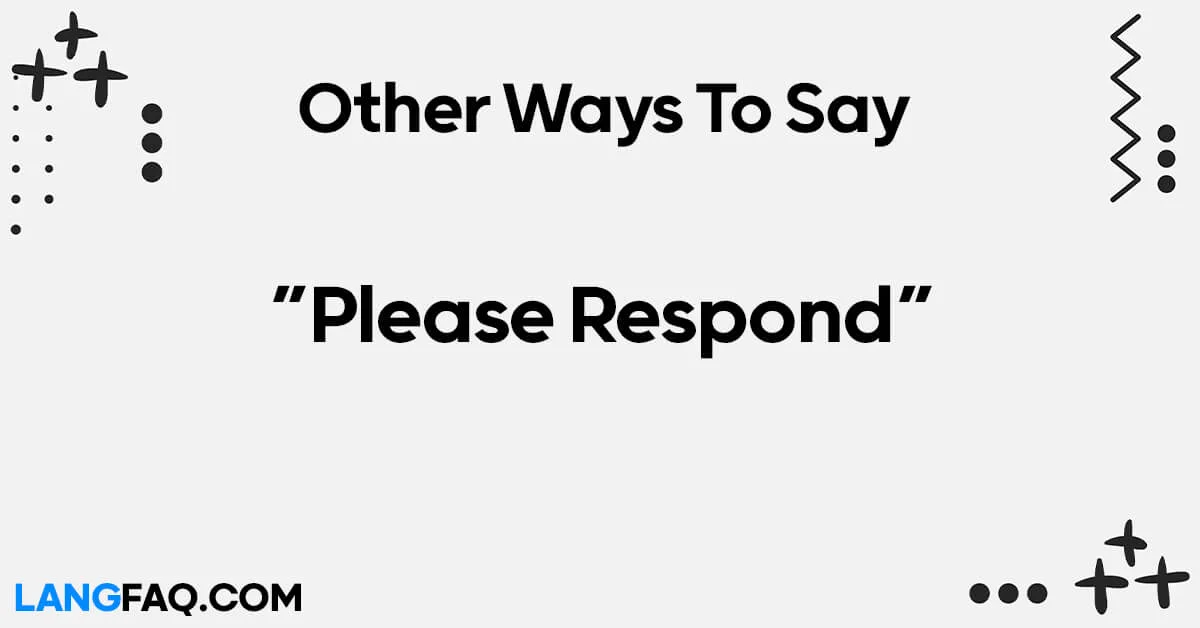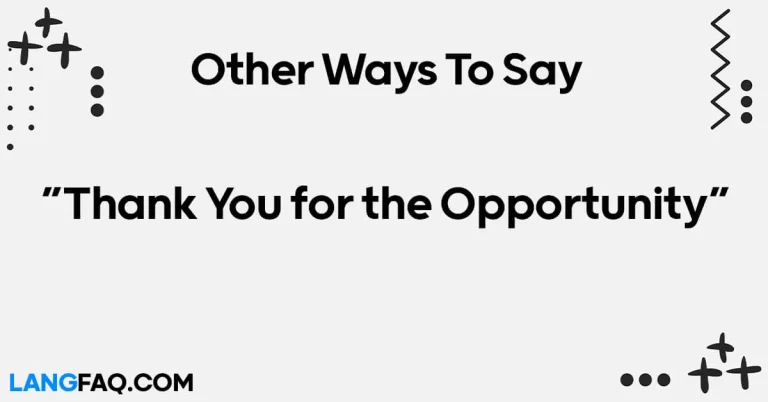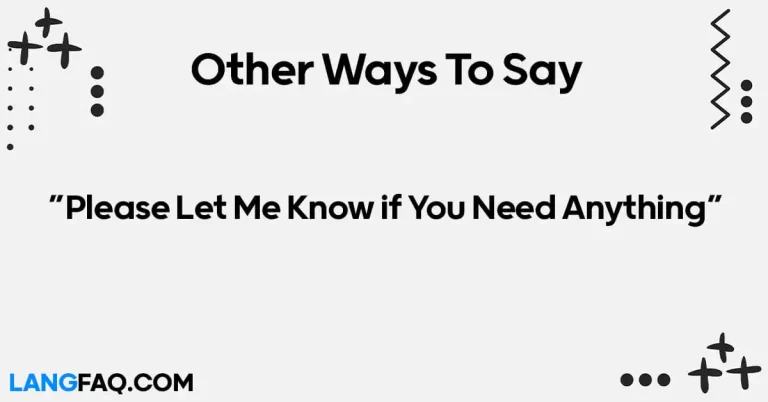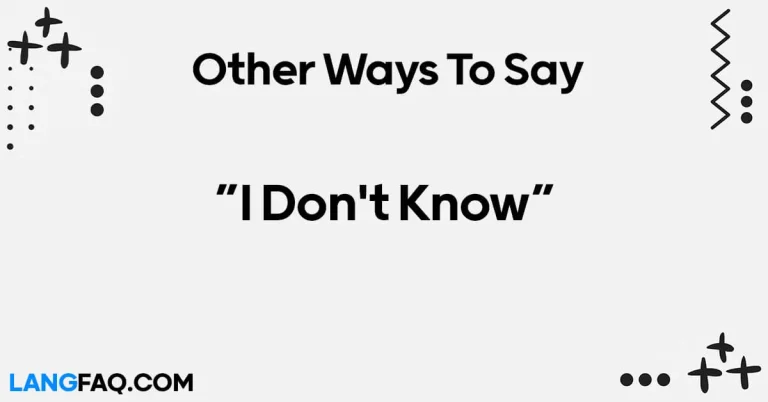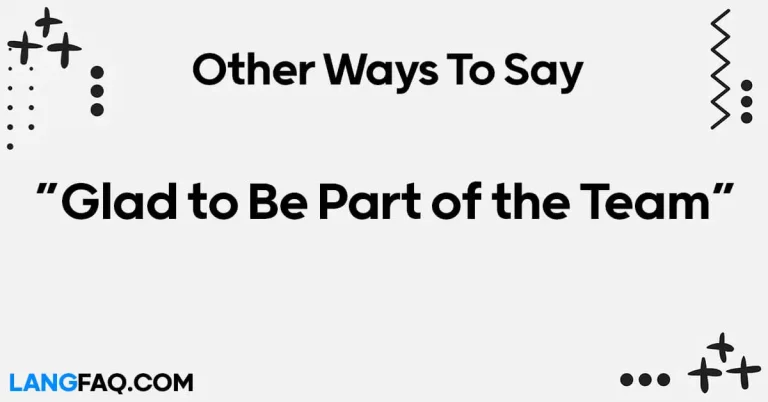In a world where effective communication is key, finding diverse ways to express a common sentiment is invaluable. This article explores 12 other ways to say “Please Respond,” offering insights that go beyond the conventional. Elevate your communication skills and add flair to your interactions.
12 Other Ways to Say “Please Respond”
Here are 12 alternative ways to express “Please Respond”:
- Kindly reply at your earliest convenience.
- I eagerly await your response.
- Can you please get back to me?
- Your prompt reply would be appreciated.
- Feel free to share your thoughts.
- I’m looking forward to hearing from you.
- Could you let me know your thoughts?
- Your input is highly valued.
- Please don’t hesitate to respond.
- A response from you would be great.
- I’m awaiting your feedback.
- Can you drop me a line when you have a moment?
Here’s a table with the meaning and examples for the 12 alternative ways to say “Please Respond”:
| Expression | Meaning | Example |
|---|---|---|
| Kindly reply at your earliest convenience. | Polite request for a timely response. | “Could you kindly reply at your earliest convenience?” |
| I eagerly await your response. | Expressing anticipation for a reply. | “I eagerly await your response to my inquiry.” |
| Can you please get back to me? | Requesting a response in a polite manner. | “Can you please get back to me regarding the details?” |
| Your prompt reply would be appreciated. | Emphasizing the need for a quick response. | “Your prompt reply would be appreciated. Thank you.” |
| Feel free to share your thoughts. | Encouraging open communication. | “Feel free to share your thoughts on the proposed plan.” |
| I’m looking forward to hearing from you. | Expressing anticipation for a reply. | “I’m looking forward to hearing from you soon.” |
| Could you let me know your thoughts? | Seeking input or opinion. | “Could you let me know your thoughts on the matter?” |
| Your input is highly valued. | Conveying the importance of their response. | “Your input is highly valued in our decision-making.” |
| Please don’t hesitate to respond. | Encouraging a prompt and willing reply. | “Please don’t hesitate to respond if you have any input.” |
| A response from you would be great. | Expressing eagerness for a reply. | “A response from you would be great to move forward.” |
| I’m awaiting your feedback. | Indicating the expectation of a reply. | “I’m awaiting your feedback on the proposed changes.” |
| Can you drop me a line when you have a moment? | Casual request for a response. | “Can you drop me a line when you have a moment to discuss?” |
This table provides a diverse range of expressions to replace the common phrase “Please Respond.” Each alternative carries its own nuance, allowing you to tailor your communication style based on the context and relationship with the recipient. Whether you’re aiming for formality, enthusiasm, or a casual tone, these alternatives offer versatile ways to enhance your communication skills and foster meaningful interactions. By incorporating these variations into your language, you can add depth and creativity to your requests, creating a more engaging and effective dialogue.
Is It Correct to Say “Please Respond”?
Using the phrase “Please Respond” is grammatically correct and widely used in various contexts, especially in written communication. It is a direct and clear way to request a reply or acknowledgment from the recipient. However, for a more varied and polished communication style, you can explore alternative expressions to convey the same message.
While “Please Respond” is perfectly acceptable, incorporating diverse language in your communication can enhance your interactions and make your requests more engaging. The alternatives provided earlier offer a range of expressions that you can use based on the specific tone and formality you want to convey.
Remember, the effectiveness of your communication also depends on the context and your relationship with the recipient. In professional settings or formal correspondence, using polite language is crucial, while in more casual situations, you might opt for a friendlier or more relaxed tone.
Professional Mail Example With “Please Respond”
Subject: Clarification Needed on Project Timeline
Dear [Recipient’s Name],
I trust this email finds you well. I am writing to seek clarification and input on the proposed adjustments to the project timeline. Your expertise in project management is highly valued, and your insights will play a crucial role in finalizing our strategic approach.
Please review the attached document outlining the proposed changes and provide your feedback by [specified date]. Your prompt response is appreciated, as we aim to move forward swiftly with the implementation.
Should you have any questions or require further details, please do not hesitate to reach out. I am available for a brief discussion at your earliest convenience.
Thank you for your attention to this matter, and I look forward to your valuable input.
Best regards,
[Your Full Name] [Your Position] [Your Company] [Contact Information]
Prompt Replies: Navigating Timely Responses
In the realm of effective communication, prompt replies are crucial for maintaining a dynamic and respectful conversation. This phrase sets the tone for responsiveness, making it ideal for professional settings and urgent matters. It’s a versatile expression that showcases your commitment to efficient communication.
Example Sentence: “I appreciate your swift response to my email regarding the upcoming meeting agenda. Your prompt replies contribute significantly to our team’s efficiency.”
Variations:
- Colleague Context: “Thanks for getting back to me quickly on the project updates.”
- Informal Context: “Your speedy replies to our messages really make coordinating plans a breeze.”
Email Sample:
Subject: Quick Confirmation Needed
Hi [Recipient’s Name],
Could I trouble you for a quick response regarding your availability for the team meeting tomorrow? Your prompt replies are greatly appreciated.
Best regards, [Your Name]
Your Thoughts, Please?: Encouraging Open Dialogue
Seeking opinions and fostering open dialogue is essential in various communication scenarios. This expression is particularly effective when you want to encourage collaboration, making it suitable for both professional and informal contexts. It invites others to share their perspectives, promoting a more inclusive and engaging conversation.
Example Sentence: “Your thoughts on the proposed marketing strategy are crucial. Please share them during our team meeting to ensure we consider all viewpoints.”
Variations:
- Colleague Context: “I’d love to hear your thoughts on the new project proposal during our next team discussion.”
- Informal Context: “What are your thoughts on trying out the new restaurant for lunch?”
Email Sample:
Subject: Input Needed for Project Evaluation
Hello [Recipient’s Name],
I hope this email finds you well. I’m currently working on the project evaluation, and your thoughts on the recent developments would be highly valuable. Could you please share your insights by the end of the day?
Thank you, [Your Name]
A Quick Note from You: Injecting Urgency
Sometimes, emphasizing the need for a speedy response is essential. This expression adds a touch of urgency while maintaining a friendly tone. It’s suitable for situations where a quick acknowledgment or brief input is required, making it versatile for various communication styles.
Example Sentence: “I’m in the final stages of the report, and a quick note from you regarding the budget allocation would be immensely helpful.”
Variations:
- Colleague Context: “Can I get a quick note from you about your availability for the client meeting tomorrow?”
- Informal Context: “Mind dropping me a quick note about your thoughts on the movie for the weekend?”
Email Sample:
Subject: Quick Input Needed
Hi [Recipient’s Name],
I hope you’re doing well. Could I get a quick note from you on the proposed changes for the upcoming project? Your timely input is crucial.
Thanks, [Your Name]
Your Prompt Attention is Requested: Emphasizing Politeness
When formality is key, expressing your request with politeness can make a significant impact. This phrase adds a touch of formality to your communication, demonstrating respect for the recipient’s time. It’s well-suited for professional interactions or situations where a higher level of courtesy is expected.
Example Sentence: “Your prompt attention to this matter is kindly requested, as we aim to finalize the proposal by the end of the day.”
Variations:
- Colleague Context: “I appreciate your prompt attention to the document revisions we discussed in the morning meeting.”
- Informal Context: “Could you give prompt attention to the RSVP for the party? Thanks!”
Email Sample:
Subject: Urgent: Request for Your Prompt Attention
Dear [Recipient’s Name],
I trust this email finds you well. Your prompt attention to the budget review is kindly requested, as we work towards finalizing our financial projections.
Best regards, [Your Name]
Your Input Matters: Highlighting Significance
When seeking a response, emphasizing the importance of the recipient’s input adds a personal touch. This expression communicates that their insights are not only desired but hold great value. It’s effective in situations where you want to convey the significance of their contribution.
Example Sentence: “Your input on the proposed changes to our workflow matters greatly, and I encourage you to share your thoughts during our upcoming team meeting.”
Variations:
- Colleague Context: “I want to express how much your input matters in our decision-making process.”
- Informal Context: “Your input on the vacation destination matters a lot to the group. What do you think?”
Email Sample:
Subject: Importance of Your Input
Hello [Recipient’s Name],
I hope this message finds you in good spirits. Your input on the upcoming project direction holds great significance for the team. Please feel free to share your thoughts during our scheduled meeting tomorrow.
Thank you, [Your Name]
I’m Eager to Hear Your Perspective: Infusing Eagerness
Expressing eagerness in your request adds enthusiasm to the conversation. This phrase creates a positive and inviting tone, making the recipient feel valued. It’s suitable for situations where you want to convey excitement and anticipation for their unique viewpoint.
Example Sentence: “I’m eager to hear your perspective on the proposed marketing campaign. Your insights will undoubtedly enrich our strategy discussions.”
Variations:
- Colleague Context: “I’m always eager to hear your perspective during our brainstorming sessions.”
- Informal Context: “I’m really eager to hear your perspective on the new book. What did you think of the plot twist?”
Email Sample:
Subject: Excited to Hear Your Perspective
Hi [Recipient’s Name],
I hope you’re well. I wanted to express my eagerness to hear your perspective on the recent developments in our ongoing project. Your insights are highly valued, and I believe they will contribute significantly to our success.
Warm regards, [Your Name]
Let’s Exchange Ideas: Fostering Collaboration
Encouraging collaboration is vital for effective teamwork and decision-making. This phrase invites a two-way conversation, emphasizing the sharing of thoughts and ideas. It’s perfect for situations where you want to foster a collaborative environment and ensure that all voices are heard.
Example Sentence: “Let’s exchange ideas on the proposed changes to the team structure. Your input is crucial for finding the best solution together.”
Variations:
- Colleague Context: “I appreciate our ability to exchange ideas during our weekly strategy sessions.”
- Informal Context: “How about we exchange ideas on the weekend getaway plans? What are your thoughts?”
Email Sample:
Subject: Collaboration on Project Strategy
Dear [Recipient’s Name],
I trust this message finds you well. I’m reaching out to suggest a meeting next week where we can exchange ideas on refining our project strategy. Your input is highly valued, and I look forward to our collaborative discussion.
Best, [Your Name]
Your Expertise is Needed: Acknowledging Specialized Knowledge
Recognizing and acknowledging the expertise of the recipient adds a personal touch to your request. This phrase communicates that their skills and knowledge are not just desired but essential for the task at hand. It’s particularly effective when seeking input in specific areas of specialization.
Example Sentence: “Your expertise in data analysis is needed for the upcoming report. Could you please share your insights and recommendations?”
Variations:
- Colleague Context: “I’ve always valued your expertise in project management. Can you share your insights on the timeline for the new initiative?”
- Informal Context: “Mind tapping into your cooking expertise for the upcoming potluck? What dish would you recommend?”
Email Sample:
Subject: Request for Your Expertise
Hello [Recipient’s Name],
I hope this email finds you in good spirits. Your expertise in [specific area] is needed for the upcoming [task/project]. Could you please take a moment to share your insights and recommendations?
Thank you, [Your Name]
Mind Sharing Your Insights?: Adding an Informal Touch
Injecting informality into your request can make it more approachable. This casual expression invites a relaxed and open response, suitable for situations where maintaining a friendly tone is essential. It’s a versatile phrase that can be used in both professional and informal settings.
Example Sentence: “Mind sharing your insights on the proposed changes to our weekly meeting schedule? Your perspective is important, and I’d love to hear your thoughts.”
Variations:
- Colleague Context: “Hey, mind sharing your insights on the new project timeline? Thanks a bunch!”
- Informal Context: “Mind sharing your insights on the best hiking trails? Planning a trip and could use some recommendations.”
Email Sample:
Subject: Quick Question – Mind Sharing Your Insights?
Hi [Recipient’s Name],
Quick question – mind sharing your insights on [topic]? Your perspective is valuable, and I’d appreciate your input.
Thanks, [Your Name]
Awaiting Your Feedback: Concise and Direct Request
When brevity is key but a response is crucial, expressing your expectation in a concise manner can be effective. This phrase communicates a sense of expectation and is suitable for situations where you need feedback or input promptly.
Example Sentence: “Awaiting your feedback on the proposed changes to the project timeline. Your timely response is integral to keeping everything on track.”
Variations:
- Colleague Context: “Awaiting your feedback on the revised budget. Your insights are crucial for finalizing the financial plan.”
- Informal Context: “Hey, awaiting your feedback on the dinner plans. Let me know what you think!”
Email Sample:
Subject: Feedback Needed on Project Timeline
Hi [Recipient’s Name],
Hope you’re well. Could you please provide your feedback on the proposed changes to the project timeline? Your input is valued, and we’re aiming to finalize this soon.
Thanks, [Your Name]
Your Response is Awaited: Direct and Unambiguous Request
For situations where clarity is paramount, this straightforward phrase leaves no room for ambiguity. It clearly communicates the expectation of a reply and is ideal when a quick response is essential.
Example Sentence: “Your response is awaited regarding the client’s queries. Timely input is crucial to maintaining a positive client relationship.”
Variations:
- Colleague Context: “Your response is awaited for the team’s approval on the new project proposal. We’re on a tight deadline.”
- Informal Context: “Your response is awaited on the weekend plans. Let me know your availability.”
Email Sample:
Subject: Urgent: Your Response is Awaited
Dear [Recipient’s Name],
I hope this email finds you well. Urgently awaiting your response on [specific matter]. Your prompt attention to this is greatly appreciated.
Best regards, [Your Name]
Can I Get Your Take?: Seeking Personalized Opinion
For a more personalized approach, this phrase invites the recipient to share their unique perspective. It adds a friendly touch to your request, making it suitable for situations where you value the individual’s opinion.
Example Sentence: “Can I get your take on the proposed changes to our team structure? Your personal insights will help shape our decisions moving forward.”
Variations:
- Colleague Context: “Can I get your take on the client’s feedback? Your perspective is valuable in addressing their concerns.”
- Informal Context: “Hey, can I get your take on the latest movie? Planning a movie night and could use your recommendation.”
Email Sample:
Subject: Seeking Your Take on [Topic]
Hello [Recipient’s Name],
I trust you’re doing well. I’m reaching out to get your take on [topic]. Your personal insights are valued, and I appreciate your input.
Thank you, [Your Name]
Hoping for Your Input: Optimistic Invitation for Participation
Expressing hope in your request adds an optimistic touch, inviting the recipient to actively participate. This phrase is effective in encouraging involvement and is suitable for scenarios where you want to convey a positive and inclusive atmosphere.
Example Sentence: “Hoping for your input on the upcoming team-building activities. Your suggestions will contribute to creating engaging and enjoyable experiences for everyone.”
Variations:
- Colleague Context: “Hoping for your input on the new project kickoff event. Let’s make it memorable together!”
- Informal Context: “Hey, hoping for your input on the weekend plans. Let’s make it a great one!”
Email Sample:
Subject: Your Input Needed for Team-Building
Hi [Recipient’s Name],
I hope this message finds you in good spirits. We’re planning upcoming team-building activities and are hoping for your input. Your suggestions will play a key role in making these events enjoyable for everyone.
Best, [Your Name]
Eagerly Awaiting Your Reply: Conveying Enthusiasm for Response
Injecting enthusiasm into your request can create a positive and engaging tone. This phrase conveys eagerness and excitement for the recipient’s reply, making it suitable for situations where you want to maintain a lively and upbeat atmosphere.
Example Sentence: “Eagerly awaiting your reply to our proposal. Your insights are crucial, and I’m excited to hear your thoughts on our potential collaboration.”
Variations:
- Colleague Context: “Eagerly awaiting your reply on the new project strategy. Let’s bring our ideas together for success!”
- Informal Context: “Hey, eagerly awaiting your reply on the weekend getaway plans. Excited to make some fun plans!”
Email Sample:
Subject: Excitedly Awaiting Your Response
Dear [Recipient’s Name],
I trust this email finds you well. I’m eagerly awaiting your response to our proposal. Your insights are integral to our collaboration, and I’m excited to hear your thoughts.
Best regards, [Your Name]
Your Thoughts, if You Please: Polite Invitation for Opinions
Combining politeness with an invitation for opinions creates a respectful and encouraging request. This phrase is suitable for various contexts, conveying the importance of the recipient’s thoughts while maintaining a courteous tone.
Example Sentence: “Your thoughts, if you please, on the proposed changes to our project timeline. Your perspective is valued, and I appreciate your input.”
Variations:
- Colleague Context: “Your thoughts, if you please, on the team’s approach to client meetings. Your insights will contribute to our success.”
- Informal Context: “Hey, your thoughts, if you please, on the new restaurant for dinner. I value your opinion!”
Email Sample:
Subject: Request for Your Thoughts
Hello [Recipient’s Name],
I hope you’re having a wonderful day. I’m reaching out to request your thoughts, if you please, on [topic]. Your perspective is valued, and I look forward to hearing from you.
Thank you, [Your Name]
Frequently Asked Questions
Q: Are these alternatives suitable for professional communication? A: Absolutely! These alternatives are crafted to suit both professional and casual communication settings, adding versatility to your language.
Q: Can I use these expressions in written communication? A: Certainly! Whether in emails, messages, or formal documents, these alternatives can elevate the tone of your written communication.
Q: Do these alternatives convey urgency without sounding demanding? A: Yes, each expression is designed to convey urgency politely, ensuring your message is clear without appearing forceful.
Q: How can I choose the right expression for a specific context? A: Consider the tone and formality of the situation. Opt for expressions that align with the nature of your communication and the relationship with the recipient.
Q: Are these alternatives suitable for group discussions? A: Absolutely! These expressions foster engagement and collaboration, making them suitable for various group settings.
Q: Can I mix and match these alternatives in a single conversation? A: Certainly! Feel free to use a combination of expressions to keep your communication dynamic and engaging.
Conclusion
Mastering the art of communication involves more than just words; it’s about expressing yourself effectively and fostering meaningful interactions. By incorporating these 12 other ways to say “Please Respond,” you can add a touch of creativity to your conversations. Remember, communication is a two-way street, and your choice of words plays a pivotal role in building strong connections.

